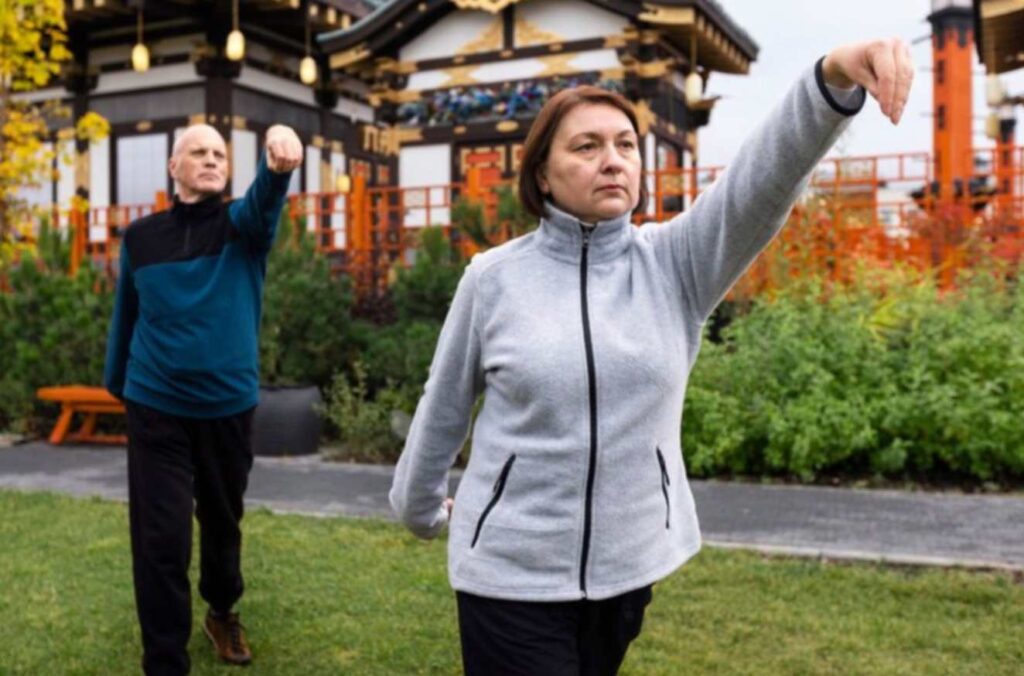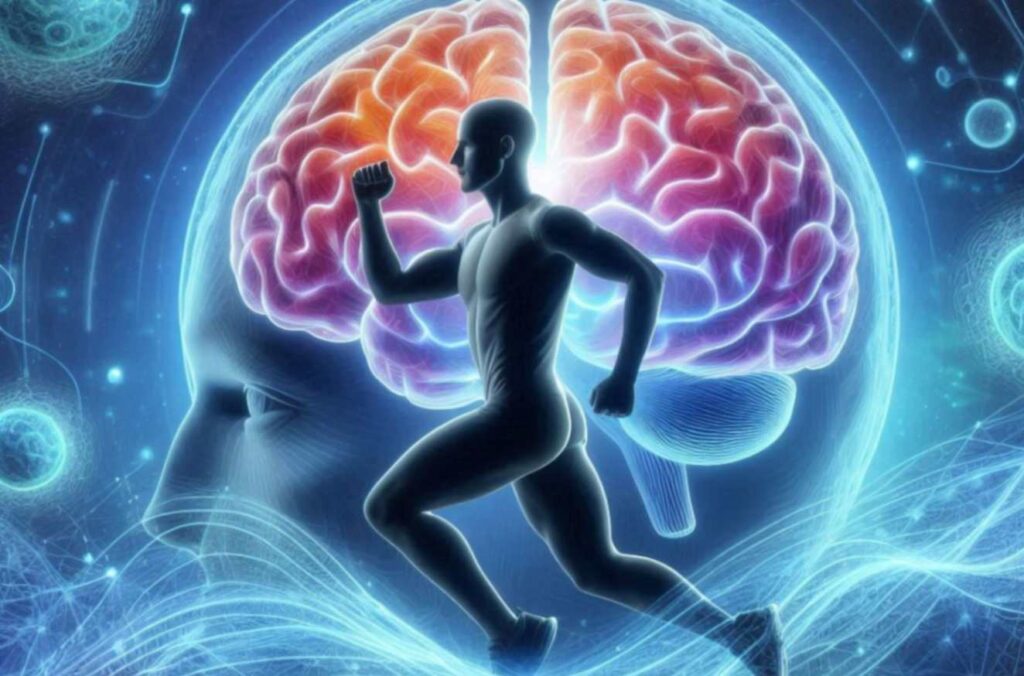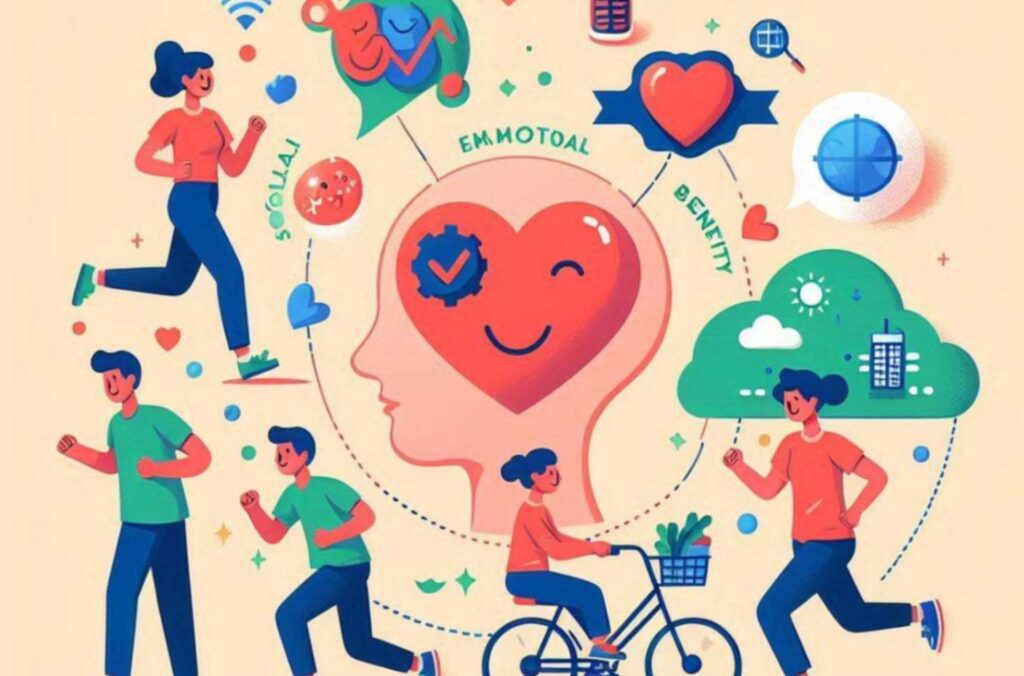Physical activity is not just about being fit; it is a powerful instrument to change your life. Regular exercise boosts your health, sharpens your mind, and improves your mood. It can help you sleep better, live longer, and feel more connected to others. Discover how moving more can improve every part of your life. Read on to learn about the five life-changing benefits of physical activity.
1. Enhanced Physical Health:
Improved cardiovascular health:
Regular physical activity is beneficial for the heart as it enhances heart function and decreases the possibility of heart disease. Exercise strengthens the,
- Heart muscle.
- Reduces blood pressure.
- Enhances circulation.
Thereby improving overall heart health.
Strengthened Muscles and Bones:
Regular exercise is vital for strengthening and protecting muscles and bones. Activities like walking, jogging, or resistance training, which involve bearing weight, encourage bone growth, lower the risk of osteoporosis, and enhance overall muscle strength and endurance.

Better Weight Management:
Physical activity is essential for managing weight by burning calories and boosting metabolism. When paired with a balanced diet, regular exercise aids in reaching and to maintain a healthy weight, thus lowering the risk of obesity and associated health issues.
Boosted immune system:
Regular physical activity strengthens the immune system, making the body more flexible to infections and diseases. Exercise increases the production of white blood cells, antibodies, and other components of the immune system, which help defend against pathogens and disease.
2. Mental Health and Cognitive Function:
Reduction in Anxiety and Depression:
Physical activity is a natural remedy for anxiety and depression. When you exercise, your body releases endorphins, often called “feel-good” hormones. These endorphins help reduce stress and boost your mood.
Studies show that regular exercise can be just as effective as medication for treating mild to moderate depression. Activities like walking, gym sessions, or yoga can significantly improve mental health.
Better cognitive function:
Exercise boosts both your brainpower and your body. Regular physical activity improves memory and learning. Activities that get your heart pumping, like
- Running.
- Cycling.
Increase blood flow to the brain. This helps grow new brain cells and keeps your mind sharp. Exercise is also linked to a lower risk of cognitive decline and diseases like Alzheimer’s.

Improved Focus and Concentration:
Physical activity enhances your attention and concentration. Exercise boosts the levels of brain chemicals like dopamine and norepinephrine, which keep you alert and focused. Engaging in a brisk workout can sharpen your mind, making you more productive. Regular physical activity contributes to improved performance in various areas of life.
Stress Relief and Emotional Balance:
Exercise is a potent way to handle stress. Physical activity lowers the body’s stress hormones like adrenaline and cortisol. It also triggers the release of endorphins, which act as natural pain relievers and mood boosters. Engaging in activities such as swimming, hiking, or dancing offers a healthy way to release tension. Regular exercise supports you in staying calm and collected during tough times.
3. Improved Sleep Quality:
Regulation of sleep patterns:
Physical activity helps regulate sleep patterns by promoting natural circadian rhythms. Regular exercise during the day can signal your body that it’s time to rest, which improves sleep quality.
Enhanced Restorative Sleep:
Engaging in physical activity promotes deep, restful sleep, giving your body a chance to repair and rejuvenate overnight. Quality sleep is essential for overall health and well-being, improving mood, cognitive function and energy levels.

Reduction in Insomnia Symptoms:
Regular exercise has been shown to reduce symptoms of insomnia, such as difficulty falling or staying asleep. Physical activity helps relax the body and mind, making it easier to fall into restful sleep.
Improved daytime Alertness:
By promoting better sleep at night, physical activity increases daytime alertness and productivity. Waking up feeling refreshed and rested allows you to tackle daily tasks with greater focus, energy and efficiency.
4. Increased Longevity:
Extended Life Expectancy:
Regular physical activity is associated with longer life expectancy. Studies show that people who exercise regularly live longer than those who lead a sedentary lifestyle.
Better quality of life:
An active lifestyle not only extends life but also improves quality of life. Regular exercise reduces the risk of chronic diseases, increases physical function, and promotes overall well-being in older adults.

Prevention of Age-Related Decline:
Physical activity is key to maintaining health and vitality as you age. Regular exercise helps to save muscle mass, bone density, and cognitive function, delaying the onset of age-related decline and disabilities.
Greater Independence in Older Age:
Being physically active allows older adults to maintain independence and autonomy in daily activities, leading to a higher quality of life and overall satisfaction in later years.
5. Social and Emotional Benefits:
Social Engagement:
Physical activity provides opportunities for social interaction and connection. Joining group exercise classes or sports teams promotes friendship and a sense of community, which increases overall well-being.
Boosted Self-Esteem and Confidence:
Achieving fitness goals and improving physical abilities boosts self-esteem and confidence. Regular exercise promotes a positive body image and a sense of success, leading to greater self-esteem.

Stress Relief and Relaxation:
One of the best ways to reduce stress and anxiety is to exercise. Exercise improves emotional well-being by promoting relaxation, lowering anxiety, and stimulating the production of endorphins.
Enhanced Mood and Happiness:
Regular physical activity is associated with better mood and overall happiness. Exercise stimulates the production of neurotransmitters such as serotonin and dopamine, which promote feelings of well-being and satisfaction.
Scientific Research on Physical Activity:
Research on the benefits of physical activity is extensive and compelling. Dr. I Min Lee, a leading scientist at Harvard Medical School, has conducted important studies showing that regular exercise significantly reduces the risk of chronic diseases such as heart disease and diabetes.

Moreover, a landmark study by Dr. James Blumenthal at Duke University found that exercise can be as effective as antidepressants in treating major depression. These unique insights from scientific research highlight the changing effects of physical activity on both physical and mental health.
Read More About 5 Early Whooping Cough Symptoms.
Conclusion:
In conclusion, the positive effects of physical activity reach beyond just fitness. From improving physical health and brain function to fostering social bonds and emotional wellness, regular exercise is vital for leading a vibrant and fulfilling life.
By making physical activity into our daily routine, we can unlock a wealth of positive changes that contribute to our overall happiness and longevity. So let’s lace up our shoes, hit the gym, or just take a walk in the park, knowing that every step we take brings us closer to a healthier, happier future.
FAQs:
How much physical activity do I need to experience health benefits?
To experience significant health benefits, adults should engage in at least 150 minutes of moderate-intensity aerobic activity, such as brisk walking, or 75 minutes of vigorous-intensity activity, such as running, working out, and twice a week. Or more than two weight-strengthening activities are included.
What types of physical activities are best for overall health?
A combination of aerobic exercise, such as walking, running, or swimming, and muscle-strengthening activities, such as weightlifting or resistance training, is best for overall health. Flexibility exercises, such as yoga or stretching, also contribute to joint health and mobility.
Related:
Which of these is not Important for Positive Mental Health?
Mental health is the foundation of a happy and balanced life. It is influenced by…
What is Commonly Misdiagnosed as Pink Eye?
Pink eye, or conjunctivitis, is a common eye problem. It causes redness, itching and sometimes…



1 thought on “5 Benefits of Physical Activity.”